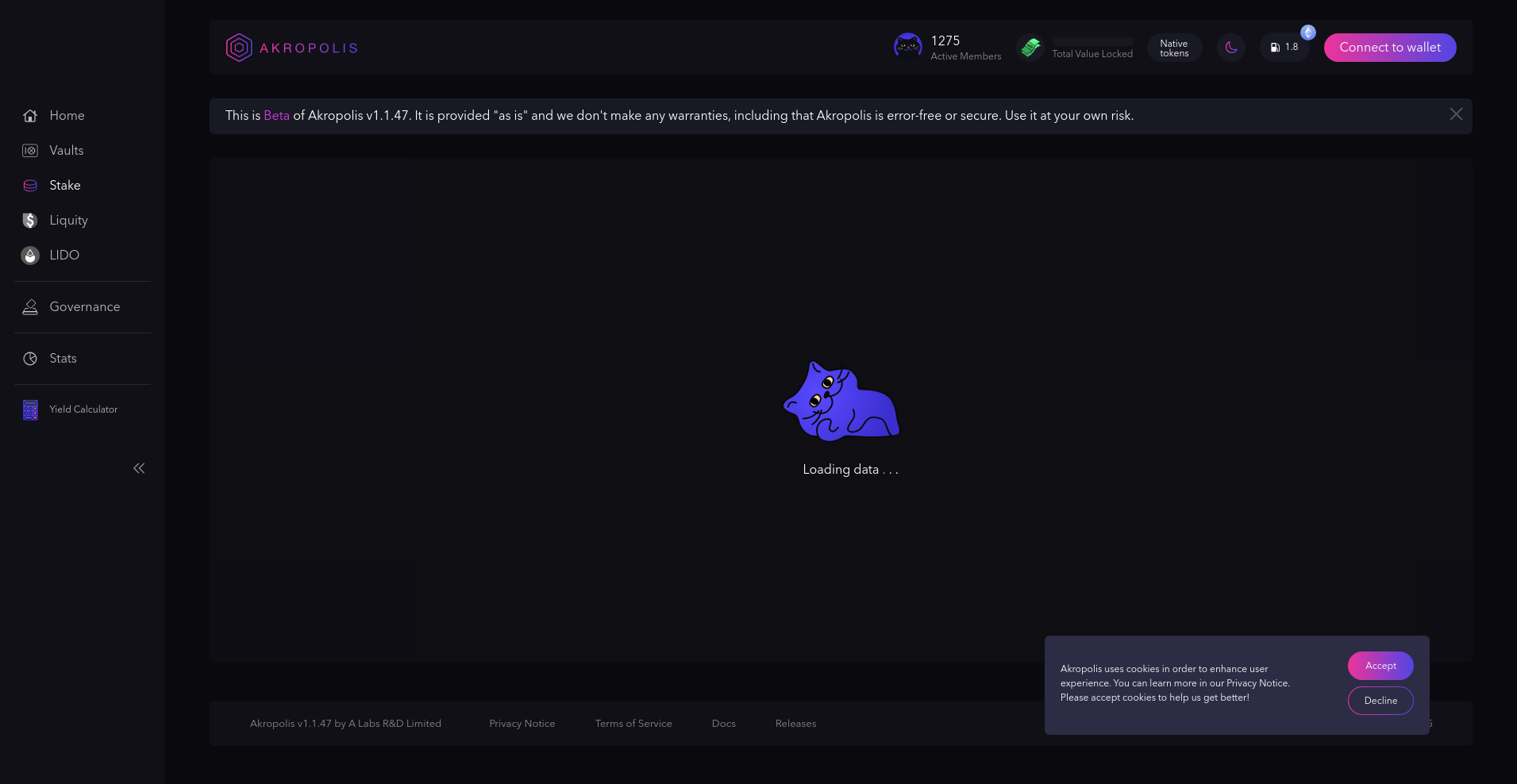Akropolis Review: Scam or Legit Crypto? Uncovering All The Red Flags

What Exactly Is Akropolis?
Akropolis emerged as a DeFi project promising innovative financial solutions built on blockchain technology. The platform gained attention with its focus on decentralized governance, yield farming, and liquidity management. At its peak, Akropolis aimed to position itself as a key player in the decentralized finance ecosystem, with claims of transparency and community-driven development.
However, as part of our investigative duty, this article delves into whether these claims hold water or mask underlying risks. We examine the project's current status, security posture, tokenomics, and overall legitimacy to determine if Akropolis is a trustworthy project or a potential crypto scam.

Who Is The Team Behind Akropolis?
One of the hallmarks of a credible crypto project is transparent and doxxed leadership. In the case of Akropolis, there is scant publicly available information on the team members. The project is operated under the corporate name "A Labs R&D Limited," registered in the British Virgin Islands, but no clear details about the founders or developers are provided.
This opacity raises immediate red flags regarding accountability and long-term commitment. Investors should question whether the team has the technical expertise or genuine intent to see the project through or if the entire venture is built more on marketing hype than solid development. Assessing crypto project transparency is crucial when assessing any new venture.
- Roadmap and Vision: The project’s official site mentions a rebranding to Kaon, focusing on building a secure, programmable Bitcoin Layer 1 with EVM compatibility. While ambitious, there is little evidence of concrete progress or public development milestones beyond generic statements. Learn more about this ambitious Bitcoin Layer 1 initiative.
- Technical Claims: The stated focus on Bitcoin interoperability and EVM compatibility are technically complex goals. No verifiable or reputable technical audits or development updates convincingly support their claims.
- Credibility: The lack of transparent leadership or verifiable team history diminishes trustworthiness, especially considering the weak public engagement.
Overall, the team’s ambiguity and vague roadmap weaken their credibility significantly, making this a risky project for potential investors seeking transparency.

Akropolis Security Audit: A Deep Dive into the Code
Security is paramount in DeFi, and an audit provides critical insight into a project’s vulnerability profile. According to available audit data, Akropolis underwent a platform audit by Certik, a well-known cybersecurity auditing firm. The audit coverage was approximately 80%, indicating a notable level of scrutiny, but not exhaustive. Understanding the importance of full code audits in DeFi highlights the risks here.
Key findings from the audit include:
- Incomplete Coverage: An 80% audit coverage suggests some parts of the codebase remain unreviewed, leaving potential vulnerabilities unexamined.
- Bug Bounties Active: The project maintains a bug bounty program, which is positive, but this alone does not guarantee security.
- Incidents Reported: The site indicates past incidents, implying there have been security or operational issues, though specifics are not disclosed.
- Audit Transparency: The audit reports are publicly available, a positive sign, but the details reveal areas of concern similar to common DeFi vulnerabilities.
While the existence of an audit is reassuring, the incomplete scope and past incidents underscore lingering security risks. Investors should remain cautious, as partial audits can overlook critical vulnerabilities that might be exploited.
Akropolis Tokenomics: A Fair System or a Trap?
The Akropolis token (AKRO) features a total supply of 15 billion tokens—a notably high figure that raises concerns about inflation and the potential for devaluation. The tokenomics details are sparse, but available data reveal a distribution that appears somewhat centralized, with significant token holdings potentially in the hands of insiders or the development team. Navigating high token supply risks is a common challenge in altcoin markets.
- Total Supply: 15,000,000,000 AKRO tokens, which may lead to inflationary pressures if new tokens are continuously minted or released.
- Market Cap and Price: Currently around $0.00013045 per token, with a market cap of approximately $610,612—a relatively small market cap for a project claiming DeFi ambitions.
- Distribution & Vesting: Lack of detailed information on token distribution, team allocations, or vesting periods increases the risk of dumps and price manipulation.
- Utility & Incentives: The token is supposed to facilitate governance and staking, but the specifics are unclear, and such mechanisms are often used to inflate token use without real value backing.
The high supply, combined with limited transparency and unclear utility, suggests a risk of inflation-driven price crashes. Investors should be wary of a possible dump if the team or early insiders decide to liquidate large holdings.
Is Akropolis a Ghost Town? Checking for Real Activity
While notices of ongoing bug bounty programs and platform audits are promising, active development and community engagement appear muted. The project's social presence (Reddit, Telegram, Medium) exists but lacks recent updates or vibrant discussions.
The platform itself is in beta and warns users about errors and security concerns. The listed snapshots show a platform that looks functional but half-baked, with no significant updates, partnerships, or new features to suggest active, ongoing development.
There’s a stark contrast between the promising marketing language and the minimal real-world coding or ecosystem activity. This stagnation indicates that the project could be more of a static front than an evolving product, a common trait among potential scams or abandoned projects.
What Akropolis's Legal Documents Are Hiding
Examining the project’s terms and conditions reveals typical disclaimers aimed at absolving the team of liability but contains some concerning clauses:
- No warranties: The platform is provided “as is,” with no guarantees of security, accuracy, or uptime.
- Risk disclaimer: Users are explicitly warned that participating in the platform is at their own risk, with no recourse for losses.
- Limited accountability: The legal documents heavily favor the project operators, with little rider for user protection.
- Potential hidden costs: No clear explanations are given about fees, token inflation, or other hidden charges, suggesting possible predatory clauses.
Such legal language is typical among high-risk DeFi projects and warrants caution, especially given the lack of comprehensive disclosures.
Final Verdict: Should You Risk Investing in Akropolis?
Based on the gathered evidence, Akropolis presents itself as a project rife with red flags and opaque practices. While it has undergone some audits and maintains an active bug bounty, the overall picture points toward a high-risk venture that may not deliver on its lofty promises. The lack of transparency, questionable legality, insecure platform state, and questionable tokenomics make this project a questionable investment.
Investors must conduct thorough crypto due diligence before considering exposure to Akropolis, and exercise skepticism regarding its claims of innovation and security. As with many crypto projects, it’s essential to remember that high returns often come with significant risk of loss, especially with projects showing early signs of stagnation or suspicious opacity.
- Positive Points:
- Availability of some security audits
- Active bug bounty programs
- Presence on multiple social platforms
- Major Red Flags:
- Opaque development team and leadership
- Limited recent activity and updates
- High token supply with unclear utility
- Unclear or partial audits with potential vulnerabilities
- Legal disclaimers heavily favoring project owners
In conclusion, unless you are willing to accept considerable risks and uncertainties, it is advisable to approach Akropolis with caution—or avoid investing altogether until more transparency, security, and real-world progress are demonstrated.

James Carter
Chief On-Chain Analyst
On-chain analyst with a background in financial fraud detection. I use data science to dissect blockchains, find the truth, and expose scams. My motto: code doesn't lie.
Similar Projects
-
Gatsby Token
Gatsby Token Review – Crypto Scam Checker and Project Scam Review
-
SingularDEX
Comprehensive Review of SingularDEX: Crypto Scam Checker & Project Analysis
-
DeGuard
DeGuard Review: Is This Web3 VPN Project a Scam or Legit? Crypto Scam Checker
-
Labda
Labda Project Review | Is It a Crypto Scam or Legit? Crypto Scam Checker
-
LEO Token
LEO Token ($LEO) Review: Analyzing Its Past Performance and Risks